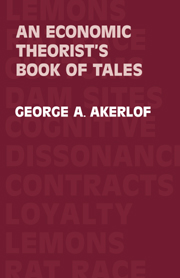Book contents
- Frontmatter
- Contents
- Acknowledgments
- 1 Introduction
- 2 The market for “lemons”: quality uncertainty and the market mechanism
- 3 The economics of caste and of the rat race and other woeful tales
- 4 The economics of “tagging” as applied to the optimal income tax, welfare programs, and manpower planning
- 5 A theory of social custom, of which unemployment may be one consequence
- 6 Jobs as dam sites
- 7 The economic consequences of cognitive dissonance with William T. Dickens
- 8 Labor contracts as partial gift exchange
- 9 Loyalty filters
- Index
9 - Loyalty filters
Published online by Cambridge University Press: 18 December 2009
- Frontmatter
- Contents
- Acknowledgments
- 1 Introduction
- 2 The market for “lemons”: quality uncertainty and the market mechanism
- 3 The economics of caste and of the rat race and other woeful tales
- 4 The economics of “tagging” as applied to the optimal income tax, welfare programs, and manpower planning
- 5 A theory of social custom, of which unemployment may be one consequence
- 6 Jobs as dam sites
- 7 The economic consequences of cognitive dissonance with William T. Dickens
- 8 Labor contracts as partial gift exchange
- 9 Loyalty filters
- Index
Summary
When people go through experiences, frequently their loyalties, or their values, change. I call these value-changing experiences “loyalty filters.” This paper considers the case where these values are partially, but not totally, changeable. In addition, persons, by having a choice over their experiences, can exercise some choice over their values; or perhaps more typically, persons may choose for their children experiences that will lead them to have desired values. Insofar as this occurs, values are not fixed, as in standard economics, but are a matter of choice. Economic theory, which is largely a theory of choice, then becomes a useful tool in analyzing how these values are chosen. Most persons attempt to choose values for their children (and perhaps also for themselves) according to their economic opportunities that allow them to get along economically. According to Robert Coles' Children of Crisis, not only the wealthy (who will be discussed at some length in Section II), but also the poorest of the poor – immigrants, sharecroppers, and mountaineers – consciously teach their children values aimed at leading them best to survive economically.
The Wealth of Nations concerned itself with the issue of how the economy would behave if everyone were to behave selfishly. Adam Smith's famous answer to this question in terms of the invisible hand is the key result in economic theory.
- Type
- Chapter
- Information
- An Economic Theorist's Book of Tales , pp. 175 - 192Publisher: Cambridge University PressPrint publication year: 1984
- 12
- Cited by



